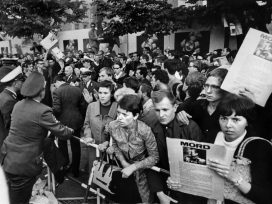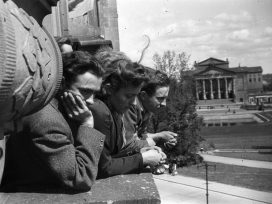I left Poland in 1971. After a year in prison and an unsuccessful job hunt, I abandoned not just the country, but also my friends and a social environment that was still feeling the effects of the March disaster in 1968. We were drained, some of us were psychologically broken, and Jacek Kuron and Karol Modzelewski were still in prison. The shadow of the Soviet intervention in Czechoslovakia was still hanging over Poland, as were the fresh wounds of December 1970.
I spent my first year in exile in Bologna. My Italy, the leftwing academic and student milieu, had also experienced a disaster. Another country, another disaster. There was a lot of nostalgia, a lot of debate about revolution and the theories of Mao. People were singing the praises of la violenza. They idealized violence, and not just in songs. Students were chanting: “Overthrow the state, don’t change it” and “violence is the only remedy where violence rules”. Terrorism was on the rise.
A year later I was in Paris, where I stayed for a long time. Memories of ’68 still hung over the city. A whole generation was pining for May, remembering their revolution, that “beautiful sickness” in the words of Leszek Kolakowski. Here, too, the revolt was different from in the East: more aesthetic, almost merry, heroic. Bernard Henri-Lévy, the post-May star, wrote that the year ’68 was one of the most important moments in the history of France.
I had the fortune to find myself in the brilliant, liberal-conservative circle around Raymond Aron; here, there were no heroes or widows of the revolution. Aron, that great humanist and critical freethinker, had been boycotted by the students and most of the academic world. Jean-Paul Sartre, who had been a friend of Aron during his youth, called for the “storming of Aron’s Bastille”, as a result of his reaction to May ’68 as a “carnival” and “psychodrama” that threatened the fragile foundations of democratic order. Indeed, when ten million striking workers joined the revolt, it looked for a while as if “power” really was “on the street”. However the communists controlling the strike did everything to isolate the workers from the students. Moscow, which was looking for an improvement in relations with the West and already had enough on its hands with the Prague Spring, was not interested in destabilizing France.
The western generation of ’68 wanted more liberty, more justice, and more recognition of the individual need for self-fulfilment, equality, openness, and “pleasure without constraints”. Young people were forcing their way onto the public scene to contest the existing Cold War order and the postwar reconstruction. The participants, but also the opponents, remembered May ’68 as a time of great debate (Aron would have called it “verbiage”). People were opening up, switching en masse to the familiar “tu” form of address in families and at universities. The revolutionaries of ’68 were turning away in disappointment from the conservative working class, instead seeing the subject of history in the “new proletarians” of the Third World, as well as in the students – a newly discovered revolutionary force. Incredible progress was made for women. Large numbers of young women took part in May, but they were still playing the role of Delacroix’s Marianne with bared breast, leading the people onto the barricades. Woman as allegory, as mascot. Yet change was happening at lightning speed. In 1965, a woman still needed her husband’s permission to open a bank account; nor could she sign a tax return. The real social and cultural revolution started in 1967 with the introduction of the pill; from now on, a woman’s sex life was no longer bound to procreation. Women became independent. The year ’68 provided the popular language of emancipation.
Some of the direct causes of the eruption of the time were obvious from the very start. The baby boom generation filled the academic institutions: there was no more room in the lecture halls, libraries and halls of residence. The students had a sense of decline and uncertainty about the future. In opening up and becoming democratic, universities had lowered their standards. Graduates, who had until now been the elite, were finding themselves on an uncertain job market.
Protest against the domination of America was also voiced in this revolt. Vietnam had led to a deep crisis in the United States and in its relations with the rest of the world. In a report prepared at the beginning of 1968 to the US Congress, Robert McNamara, the Secretary of State for Defence, wrote: “In the 1960s the bipolar arrangement we knew after World War II began to fall apart. Firm friends and confirmed enemies can no longer be so easily classified”; it was becoming hard to apply such as concepts as “the free world” or “the Iron Curtain”.
1968 was a great triumph for the mass media, especially television. “The whole world is looking at us,” said Jerry Rubin, the hippie activist and later well-known entrepreneur, during the bloody demonstrations in Chicago. And he was right. More importantly, thanks to television, the “whole world” watched the Tet Offensive, carried out by communist guerrillas in South Vietnam. For the first time, a horrified America saw the corpses of American soldiers on live television. The Vietcong may have been decimated, but the US had lost the war, although the peace treaty was signed only seven years later.
The student movement of 1968, from Berkeley to Tokyo – though not in eastern Europe – was united in protest against Vietnam. A new pacifism was appearing. It was in this guise that German nationalism, this time a leftwing version of it, re-emerged. America was identified with Nazism and the divided Germany with Vietnam. Rudi Dutschke, the leader of the German students, threatened that those who didn’t abandon their imperialistic policies would be thrown out of Germany. The new Germans certainly wanted peace, but they were also starting to teach peace to others. The German students’ extreme forms of rebellion aroused fear and brought back the worst memories. Rightwing intellectuals but also leftwingers such as Jürgen Habermas and Max Horkheimer warned about a new totalitarianism: totalitarian language; a tendency to violence; and contempt for bourgeois culture, liberalism, and pluralism.
That said, another very important aspect of 1968 in Germany was the rebellion against “the silent generation”, the settling of accounts with the parents’ generation for the crimes and cowardice of the past. From then on, German “work on memory” began for real, often involving deep reflection on national responsibility. Something similar was happening in France, although the issues of collaboration, Vichy, and Petainism only erupted fully a few years later.
The West, churned up by 1968, fascinated me; but I also felt lonely and alien. The people I met in Bologna and Paris were often near to me in age, sensitivity, and literary taste, but at the same time terribly distant. This began at the level of language. For them, the basic category was revolution. Milan Kundera contrasted the Paris uprising and its “explosion of revolutionary lyricism” to the Prague Spring and its “explosion of post-revolutionary scepticism”. What he said about the Czechs and Slovaks was also relevant to Warsaw and Poland. Except that the Polish intellectuals already had hopes for “socialism with a human face” behind them. The Western prisoners of semantics – Marxists, Leninists, Trotskyites, Maoists, situationists, anarchists, and even socialists – were describing the world in the same language as Brezhnev and Gomulka. That was enough to block conversation, not to mention agreement.
Of course, the rebels from the West had something different in mind. Their ideals were largely to do with liberation and individualism, and were often consciously anti-Soviet – they condemned official violence, “Soviet bureaucracy” and “the red bourgeoisie” – but language is not innocent. Their language carried the burden of oppression, which we knew about from experience. Leszek Kolakowski’s message to the Frankfurt students protesting against the fact that he had been offered a prestigious academic chair was: “I’m not going to get in the way of your class struggle against the professors.”
From the Polish perspective, such language was a vector not just of oppression but also of dreadful boredom. Jozef Tischner used to tell a joke about two Tatra Highlanders having a conversation at the end of war: “The reds are coming and they’ll starve us,” says one. To which the other replies: “Starve us or not, they’re sure to bore us to death”. By the 1960s, even the authorities perceived this language to be completely dead.
The sense of boredom was not just prevalent among us Poles. A few weeks before May, the great French journalist Pierre Viansson-Ponté prophetically wrote: “la France s’ennuie” – France is getting bored! The young aspired to a change in politics and in the society that had formed after the war, a hierarchical society, more closed than not, governed in authoritarian fashion by the Gaullists. The revolutionaries of ’68 did try to refresh the language with the help of prophets such as Herbert Marcuse, whose name was put on a par with Marx and Mao.
Despite their noble impulses, the protagonists of May ’68 were prisoners of this language. They had no other with which to express their rebellion. This had an influence on their way of seeing our Europe, both the Prague Spring and the March events. Their attitude was ambiguous, largely indifferent, and often hostile. We eastern Europeans were by definition counter-revolutionaries. Even if the communist authorities were a product of “the revolution betrayed”, it was still a revolution. Even if it was “bureaucratic socialism”, it was still socialism. For their part, the communists could not bear rebellious youth; their libertarian, revolutionary language threatened the whole establishment, including the communists’ ideological monopoly on the Left. Together with the Gaullists, the communists managed to destroy the May movement politically. Thank heavens. Though we should remember that this was in keeping with Moscow’s interests at the time.
The Western radicals had a completely different understanding of freedom from that of young people in Poland or Czechoslovakia. While ours was traditional, liberal, and non-violent, they treated any kind of constraint as a lack of freedom. We also differed from the western protestors in our attitude to democracy. They spoke of “direct democracy” and regarded western democracy as “formal” and as a fraud. They rejected institutions that for us were the ideal. They criticized the market and the consumer society that everyone in our country longed for.
The year ’68 dramatized the antinomies between revolt and established norms. The western spirit of ’68 was a denial of rules, constraints, and the law: the law of codes, the law of social conventions, the moral law of tradition, and even the Marxist law of history. On the walls you could read: “Be a realist, demand the impossible!” and “It is forbidden to forbid.”
The protesters in Warsaw in March ’68 or during the Prague Spring never thought of overthrowing all the rules. Quite the opposite: in struggling for freedom, their aim was to impose constraints based on the law and morality – and to impose them above all on the regime, as a way of limiting its arbitrary behaviour. Neither did the eastern ’68 have the dimension of a moral revolt.
In Poland, the ’68 movement heralded the democratic opposition of the 1970s and 1980s. A couple of years earlier, Jacek Kuron and Karol Modzelewski had written their “Open Letter to the Party” – a revolutionary, anti-Bolshevik programme, expressed in the language of Marxism. On 30 January 1968, at the final performance of Forefathers’ Eve, we chanted the words of Karol Modzelewski: “Independence without censorship”. For the first time, almost by accident, anti-political language appeared as a tool for fighting against the authorities. In protesting against censorship, demanding freedom of speech and defending their repressed colleagues, the students were invoking the law and the constitution. The language of basic rights and freedoms would soon be an important weapon of the nascent democratic opposition. The aim was not and could not be to gain power or overthrow the existing order, but to limit it and put a bridle on its tyranny.
Years later, we can clearly see the libertarian, anti-authoritarian, anti-Bolshevik, and anti-statist dimension of the western ’68. It was not pure accident that many of the leading figures of ’68 in the West went on to sympathize and support the opposition in eastern Europe. In politics, the most famous are Joschka Fischer, who came to Warsaw to learn Polish from friends of his own generation; Bernard Kouchner, who demonstrated outside the Polish embassy against the introduction of martial law; and Daniel Cohn-Bendit, who was always present wherever there was a need to defend freedom. Western ’68ers often turned up in the front ranks of those supporting KOR (“The Workers’ Defence Committee”), Solidarity, Charter ’77, and the Russian dissidents. In these circles, the ideas of the anti-totalitarian Left gained currency and a fascination with central Europe was awoken, at whose origins was Milan Kundera’s famous article, “The stolen West or The Tragedy of Central Europe” (1983). To a large degree as a result of the influence of the opposition in eastern Europe, the rights of man came to be seen as a weapon in the struggle against lawlessness worldwide. Civil society – another important component of the central European profession of faith – also pervaded the West as an essential dimension of anti-political politics.
Daniel Lindenberg’s book on the “new reactionaries” caused a great deal of debate in France when it was published in 2002. The author, a ’68er himself, described how many of his contemporaries – Alain Finkielkraut, André Glucksmann, Marcel Gauchet, and also younger writers including Michel Houellebecq – had departed from the ideals of ’68 and now occupy, in his view, conservative positions. It is no accident that many of these people, including the current French foreign minister Bernard Kouchner and the philosopher André Glucksmann, have come out in favour of the war in Iraq – just like many former members of the opposition in central Europe, such as Václav Havel, Adam Michnik, and György Konrád. Similarly, it was no accident that just before his death Rudi Dutschke said: “In retrospect, the great event of ’68 in Europe was not Paris, but Prague. But we were unable to see this at the time.”
What did the western 1968 leave behind? As a utopia it has long since been dead. However, the year ’68 did contribute to the internal democratization of Western societies. The cultural, social and moral revolution that was achieved then is still present in public clashes and ongoing debates. The social movements that came into being at the time are still alive: the feminist, ecology, gay, consumer, and regional movements. During his election campaign, Nicolas Sarkozy sharply attacked the spirit of ’68. “[The ’68ers] tried to make the victim less significant than the criminal. They claimed that there was no hierarchy of values, that everything was permissible.” The future president said this in the presence of André Glucksmann, who had become involved in party politics for the first time – on side of the rightwing candidate. Standing next to Sarkozy while this comment was made, he smiled slightly, clearly humiliated.
Glucksmann replied in a book, co-authored with his son, which appeared in February 2008, entitled, “The year ’68 explained to Nicolas Sarkozy”. In it, he explains that Sarkozy was in fact the heir of ’68. How else could a citizen like him, part Hungarian, part Jew, publicly perform the latest “recomposition” of his family and still have become president of France? Alain Finkielkraut, on the other hand, can find few words today to justify May ’68 and its attack on hierarchy of any kind, without which there can be no culture or education. For him, the cult made by his contemporaries of the events of forty years ago is “a great pantomime”.
Much less is left of March ’68. It sank with the Atlantis that was the people’s Poland, of which it was at once a part and a denial. The same thing happened to the Prague Spring, whose hope and tragedy went even further than the Polish March. It is impossible to make out any trace of the important events of 1968 in the present day, apart from the members of that generation present in various areas of public life.
So how do we explain the noisy commemoration of March in Poland today? Exhausted by years of transition, and facing problems with its own identity, Poland has been turning to the past. There was an impressive commemoration of the sixtieth anniversary of the Warsaw Uprising and another big event on the twenty-fifth anniversary of Solidarity. March ’68 fits well into this atmosphere of reflection on the past and reconstruction of national identity. Seen as a protest movement, March ’68 is clear and understandable, committed to the defence of values, which is nothing new. Yet almost nothing is said about the events of 1956, which had incomparably greater significance for postwar Poland.
The significance ascribed to March was greatly influenced, in my opinion, by the Poles’ problems with the Jews – the result of a peculiar mixture of anxiety, irritation, pangs of conscience, and aversion. Since 1989, the successive stages of the virtual Polish-Jewish civil war have been marked by the conflict over the Carmelite monastery and the crosses in the gravel pit at Auschwitz, then by Jan Tomasz Gross’s books, Neighbors and Fear.
It is hard to resolve Jewish issues according to the Christian model, where there is room for remorse, confession of guilt, forgiveness and reconciliation. It is also hard to say here: “we forgive and we ask forgiveness”. For a simple reason: there are some individual Jews in Poland, but there is no nation of Polish Jews. Just as the centuries-old history of the Jews in Spain came to an end in the fifteenth century, so the history of the Polish Jews ended in the mid-twentieth century, far more tragically. That is why the argument often levelled at Gross’s book – that it encumbers the Polish-Jewish dialogue – shows a lack of understanding of reality. There is no such dialogue and there cannot be one, because there is no Jewish partner for it. You can conduct a dialogue with Israel, or with Jewish organizations in America, but there is no longer any Polish-Jewish dialogue within Poland. It is Poland holding a dialogue with itself. And the emotions evoked by Fear – regardless of the many theses expressed in an extreme way – show how difficult this dialogue is.
Poland has problems with its neighbours, but none of the ongoing memory wars jeopardizes Polish identity. After all, no one is going to claim that it was the Germans who were the victims of the Poles – even if Jaroslaw Kaczynski is afraid of such a prospect. Similarly, no one is going to prove it was the Russians who were victims of the Poles. Even the (mutual) acknowledgement of guilt towards the Ukrainians has been happening rather easily, since it poses no threat to the Polish identity.
However images of Jedwabne or Radzilow, scenes from wartime, or the postwar pogroms in Kielce or Krakow, put a question mark beside the canonical image of Poland born of romanticism: the Christ of Nations, heroic, suffering Poland, always on the side of good, freedom and dignity.
Here too, in the Polish-Polish debate on the attitude towards Polish Jews, March appears. Everyone agrees that the abominations of the time can be blamed on “them”, “the reds”, “the communists”. Such localized responsibility allows us to talk about the tragic fate of the remains of the Polish Jews without any problems, with a clear conscience. Unfortunately, the matter is not so simple: the authorities began “ridding the Polish People’s Republic of Jews” counting on the popularity of such a policy. They did not miscalculate.
To finish, a word about Polish Jews, who played a crucial role in ’68. The March of the students, the March of the protest movement and the solidarity of the intelligentsia, involved the whole of Poland, often including social environments that were very distant from politics. And that was the finest dimension of March. This movement had nothing Jewish about it as such, although the authorities aimed their searchlights at Jews. Nevertheless, the anti-Semitic campaign of the authorities of the time does not provide a let-out from an answer to the question: why were so many Jews, Jewish Poles, Poles of Jewish descent, Poles with Jewish roots (what difficulties the Polish language has with Jewishness!) among the initiators of the ’68 movement? Not just in Poland, but also in the Paris May, or the American ’68 movement, maybe elsewhere too. I do not think this question is insincere or trivial – even if it is only of secondary importance, since the character of these rebellions would have been identical even without Jewish participation.
The truth is that many of the players involved in the first phase of March came from privileged circles in communist Poland. Often they were not the children of the authorities, but from academic, artistic or journalistic circles. Moreover, in many dictatorships (Franco’s Spain, for example) the children of the ruling elite have played a crucial role in forming rebellion against their parents’ regime. They were well informed, had an absolute sense of security (naïve, as it turned out), and found that the ideas they encountered at home conflicted grossly with the practices of the regime. The rebelliousness of young Polish Jews was also exacerbated by the rise of anti-Semitism within the ruling camp throughout the 1960s.
March was also to some extent a rebellion of children against the communist subculture of their parents’ generation – although they were often far from it by now – and against their responsibility for the dictatorship. Just as in the case of the rebellion against the “silent generation” and its responsibility for the crimes committed in Germany and France.
Finally I shall risk a hypothesis that goes far beyond the case of Poland. The Jewish generation of ’68 was the first generation after the Holocaust. It no longer felt any of the inner fear that could still be perceived in people only a few years older – fear of humiliation, of indignity, of self-debasement. Not just anti-Semites were asking the question – it is present in Hannah Arendt, or Raul Hilberg, the great historian of the Holocaust – about the reasons for Jewish passivity in the face of death. It seems to me that sub-consciously, 1968 was also a revolt of the post-Holocaust generation against the great burden of history carried by their parents’ generation. Another way of escaping from that heritage was to identify with the victory of Israel over the Arab states, and indirectly over the USSR in 1967.
Perhaps the year 1968 closed a cycle of history for Jews that began with the French Revolution. In leaving the ghetto, entering into the history of Europe, and gradually gaining full rights, Jews were rebelling at the same time against all sorts of manifestations of discrimination and injustice. They expressed their difficulties with their own condition and the pain connected with assimilation and uprootedness in the language of universal values and often in radical involvement. After the cataclysm of World War II, Jews have gradually felt better and better in the western world, shifting more and more to the Right in their political choices, moving from the Enlightenment idea of universalism, internationalism or cosmopolitanism to the particularism of Israel and the Jewish fate.
I began by looking at the Polish March from the West, to show both its magnitude and its modest aspirations. I have ended, paradoxically, with the Jewish dimension of ’68. Maybe because this article, despite my intentions, is also very personal.







